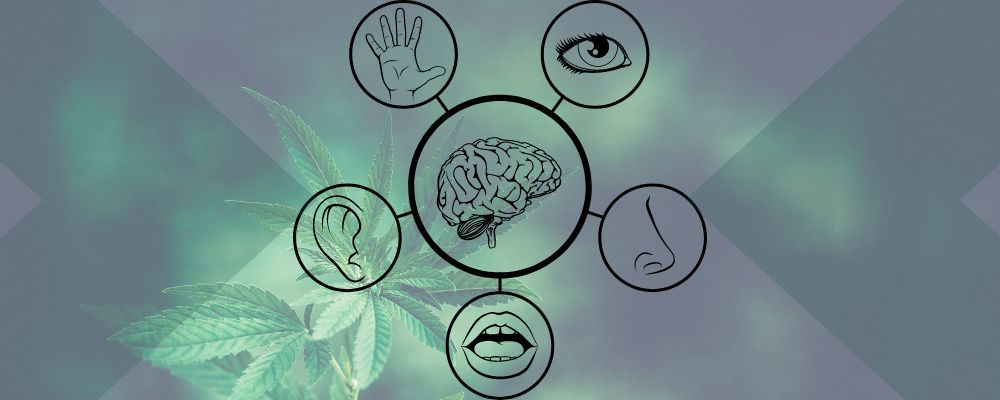Anyone who has ever used cannabis has most undoubtedly noticed a change in one or more senses, such as a strange food craving or a new perception of a favorite song. Compounds in cannabis interact with the human body’s sensory organs through the endocannabinoid system, with receptors found close to or within all sensory organs. Cannabinoids bind to these receptors in the endocannabinoid system and can influence the way you perceive tastes, sounds, and other senses depending on the type and amount of weed consumed and your own tolerance level.
How Our Five Senses Transmit Signals
Each one of our five primary senses, sight, smell, hearing, taste, and touch, allows us to experience the world around us through a complex nervous system made up of sensory organs, receptors, and neurotransmitters. Sensory organs transmit signals from external sources, sending them through the nervous system to the brain. These signals that reach our brain in nanoseconds allow us to survive in the world, to behave and react accordingly.
Our sensory organs in the central nervous system allow us to detect danger, such as feeling the heat from a fire, smelling smoke, seeing or hearing an intruder, and countless other signals such as telling us when we are hungry, allowing us to get food, and any other everyday task. Our senses can work independently or together to alert us of threats or rewards. Our senses help us respond to danger and also to experience feelings of pleasure when tasting sweet food, for example, or feeling the warm touch of companionship.
Sight is possible due to photoreceptors that convert light into electrical signals. Hearing is a result of sound vibrating the cochlea, where thousands of nerve endings transmit these vibrations into electrical signals. Cell receptors in our skin respond to temperature, chemicals, or mechanical stimuli such as touch. Our sense of smell can detect a foul or pleasant odor and receptors in the tongue transmit a response to taste.
How Cannabis Affects Our Senses
Cannabis interacts with the body’s endocannabinoid system (ECS) in quite broad yet specific ways. Cannabinoids such as THC and CBD bind to cannabinoid receptors, CB1 or CB2, affecting our senses and the central nervous system. The ECS plays an important role in many human systems, including the central nervous and musculoskeletal systems. The ECS acts as our biological computer, with neurotransmitters controlling mood, memory, appetite, and sensory processing.
Sight – science is inconclusive on the effects cannabis has on vision, with some early studies from 2004 showing it could help night vision, while other studies show that cannabis could alter visual perception and the ability to focus.
Smell – the jury is also out on the effect of cannabis on our sense of smell. Tests on animal subjects show that cannabis consumption could increase odor detection, while human studies show the opposite with a reduction in olfactory function.
Hearing – ever notice how you enjoy listening to music in a different way when high? Many cannabis users report experiencing enhanced hearing when stoned, although this may depend on concentrations of specific cannabinoids. High THC cannabis has been shown to dampen the part of the brain associated with emotion and reward, such as from listening to music, although pot with a CBD concentration brings an entourage effect that can actually increase dopamine and perceptions of sound and music.
Taste – marijuana has a history of bringing on the munchies, for good reason. Cannabis is shown to enhance flavors, particularly of sweet dishes, through taste receptors in the tongue, although studies show no impact on other tastes such as bitter, salty, or sour foods.
Touch – the central nervous system is definitely present within the skin with a network of cells relaying sensations of touch and temperature, although the effect of cannabis on touch is inconclusive. While a good majority of people and some studies report increased sensibility to touch, other controlled studies are inconclusive with only subjective data.
Most available science does show that some good weed could enhance our appreciation for sweet foods and give us a new perception of old or new music. Drawing other conclusions may demand ongoing scientific research as we are just beginning to understand the full potential of the many cannabinoids being discovered and researched and the effect on the ECS in the human body.
If you’re in the mood to spin some favorite tunes while making a big plate of nachos or your favorite munchie dish, be sure to consume only quality cannabis grown from quality seeds.
Mosca Seeds is recognized as a leading high-quality cannabis seed breeder, perfecting the finest in cannabis seed genetics. We keep all your favorite strains alive and introduce new drops all the time for a constant supply of sweet, sticky bud. Check out the Seed Bank to get the pot seed type and strain to alter your senses as you wish for the most pleasurable high.
